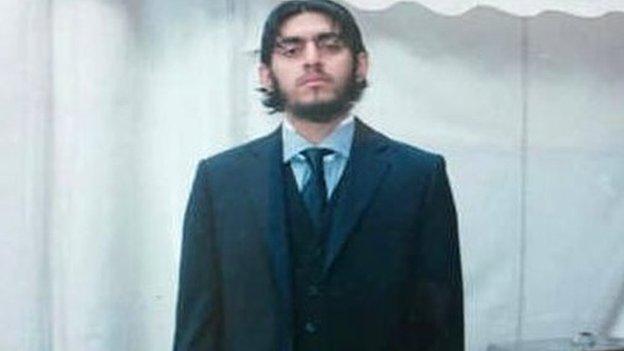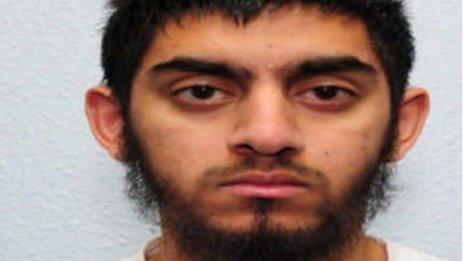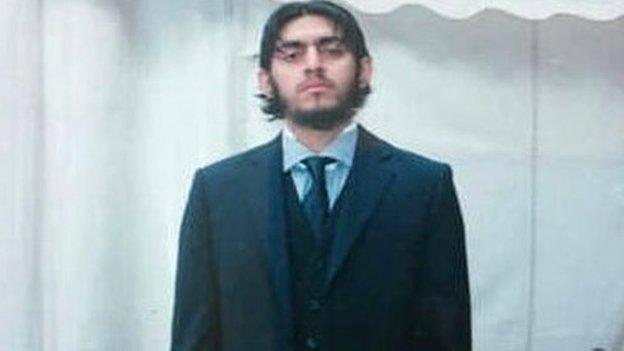Poppy Day beheading attack plotter jailed for life
- Published

Nadir Syed used encrypted online chats to share gory so-called Islamic State videos with friends
A man has been jailed for life for plotting a street beheading around the time of Remembrance Sunday in 2014.
Nadir Syed, 23, of west London, was convicted last year of preparing to carry out a so-called Islamic State-inspired attack in London, which could have targeted a poppy seller.
The judge said Syed must serve at least 15 years but he may never be released.
His cousin Yousaf Syed, 20, of High Wycombe, and Haseeb Hamayoon, 29, of west London, were cleared at a retrial.
During Syed's trial, the court heard Syed went with another man to buy a foot-long knife in the run-up to Remembrance Sunday that the judge said was specifically chosen to decapitate a victim.
Syed had earlier appeared in an online video, stamping on a poppy, saying it should "go to hell".
'Diamond geezer'
Earlier that year, Syed had attempted and failed to reach Syria to fight alongside his cousin, Yousaf.
Prosecutors said that after finding himself back at home, the committed jihadist turned his violent intentions on the UK.
He became obsessed with the 2013 murder of Fusilier Lee Rigby, describing one of the killers as a "diamond geezer".

At the Old Bailey
By BBC home affairs correspondent Dominic Casciani
Nadir Syed smiled wryly as he was taken down. He is not the first to go to prison after being convicted of preparing for acts of terrorism, but his prosecution last year was one of seven IS-linked plots referred to by the prime minister in Parliament.
Prosecutors did not have to prove that Syed had settled on a specific target and plan - only that he had taken steps - and the key one was the buying of a foot-long knife.
This offence was specifically created to allow police to arrest and charge terrorism suspects at an early stage of plotting.
Senior judges at the Court of Appeal recently set out new rules for these kinds of terrorism cases, saying that life is the correct jail term if the judge can see no sign - or immediate hope - that an ideologically-driven killer can be reformed.

'Intelligent and dangerous'
Sentencing him at the Old Bailey, Mr Justice Saunders said: "I am satisfied that the attack was going to take place at a time close to Armistice Day.
"I am also satisfied that the victim was to be someone connected to Armistice Day, such as a popper seller.

The judge said Syed would likely set out to kill if he is released from jail in the future
"I have no doubt that he is dangerous. In my judgement if he was released from prison he would go and try and carry out what he failed to achieve in this case.
"He would set out to kill in furtherance of his beliefs.
"He is an intelligent man. He had thought out what he wanted to do and I saw no sign in the evidence he gave of any change of view on this part," he added.
Syed was said to have been inspired to act by a decree from an Islamic State leader in September 2014.
The so-called "Adnani fatwa" called for followers in the West to target security services and police.
So far, it has been linked to more than 25 attacks or attempts across Europe and America.

Yousaf Syed (left) was found not guilty of involvement after a retrial and Haseeb Hamayoon was cleared by the judge after the jury failed to reach a verdict
Intention 'embryonic'
Mark Summers QC, for Syed, told the sentencing hearing that his client had, at the most, come up with an unsophisticated idea of a knife attack days before he was arrested.
"There had been no target reconnaissance … or worked-out plan," he said.
"There's no suggestion that this defendant indoctrinated others. The intention was embryonic and may never have moved to fruition."
But Mr Justice Saunders said he had no choice but to impose a life sentence and that Syed faced the prospect of never being released.
"The defendant will remain dangerous until the threat from Islamic terrorists has gone," he said.
"I cannot say when that will be. A life sentence is not only necessary but essential to protect the public from the threat this defendant poses.
"It may be that he will never be released but I would wish there to be some incentive for him to co-operate with deradicalisation programmes if and when they are made available to him."
Syed had been extensively monitored by the police and MI5 for weeks before he was arrested.
He used encrypted online chats to share gory IS videos with friends and laughed at the fate of murdered hostages.
He had installed the pin code "77911" on his mobile phone - an apparent reference to the dates of terror attacks on London and the US - and hung an IS flag on his bedroom wall at his grandmother's house.
- Published14 December 2015

- Published16 June 2016
